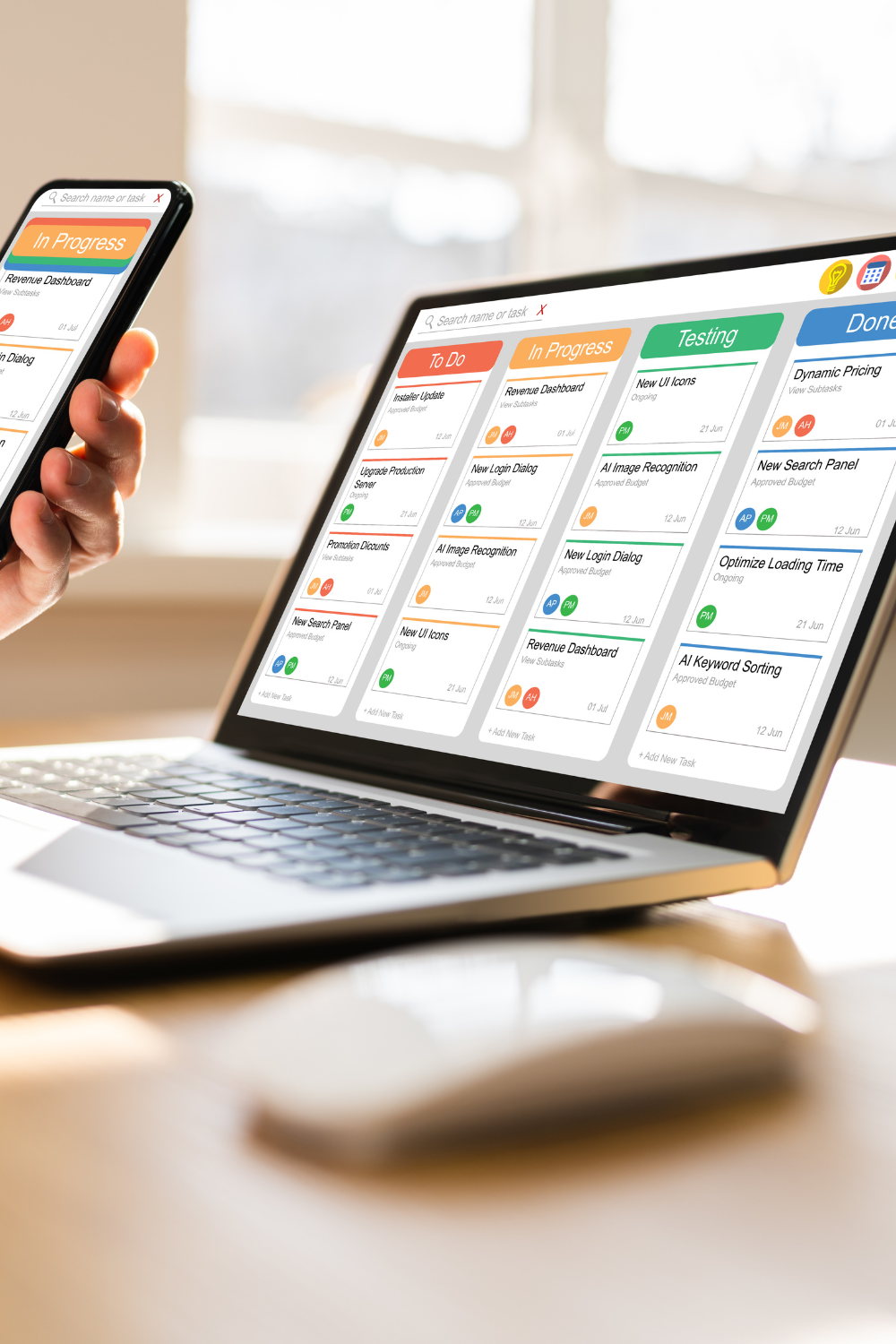The best EMR and EHR practice management software for therapists
Choosing the right practice management software is one of the most critical decisions you'll make as you start your journey to establish and grow your private practice. With so many options available, it can be overwhelming to figure out which one best suits your needs. Whether you're starting fresh or looking to upgrade your current system, understanding the pros and cons of the top private practice management software is key to making an informed decision.
In case we haven’t met, I’m Natalia Maganda, a web designer for therapists specializing in helping ambitious life coaches and mental health professionals amplify their impact, gain visibility, and streamline their marketing efforts through strategic web design and content.
When it comes to managing your private practice, having the right tools in place can make all the difference in how efficiently and effectively you serve your clients. A practice management software (PMS) is designed to simplify the daily operations of your practice, from scheduling appointments to managing client records and billing. These tools are essential for therapists who want to focus on providing care without getting bogged down in administrative tasks.
However, with so many options out there, it can be tough to decide which software is the best fit for your practice. In this guide, we'll break down the key features, pros, and cons of some of the most popular practice management software options available for therapists today.
What is practice management software?
A practice management software (PMS) is an all-in-one platform designed to help healthcare providers, including therapists, manage the administrative and clinical aspects of their practice. This includes everything from scheduling and billing to client records and reporting. These systems are built to streamline operations, reduce paperwork, and improve efficiency, allowing you to focus more on client care and less on administrative tasks.
What does a practice management software do?
A practice management software handles various tasks that are essential to running a private practice. Some of the core functions include:
- Appointment Scheduling : Easily manage and track client appointments, set reminders, and avoid double bookings.
- Billing and Invoicing : Automate billing processes, generate invoices, and manage payments from clients or insurance companies.
- Client Records : Keep all client information, including treatment plans and progress notes, in one secure place.
- Telehealth Integration : Many platforms offer integrated telehealth options, making it easier to conduct remote sessions.
- Reporting : Generate detailed reports on various aspects of your practice, such as financial performance or client progress.
What is the difference between a CRM and practice management software?
A Customer Relationship Management (CRM) system and Practice Management Software serve different purposes. A CRM is primarily used for managing client interactions, sales processes, and marketing campaigns. It's focused on maintaining client relationships and improving customer service. I love to recommend this CRM for solopreneurs and therapists .
A Practice Management Software, on the other hand, is more comprehensive and tailored specifically for healthcare providers. While it may include some CRM functionalities, its main focus is on managing the operational and clinical sides of a practice, such as scheduling, billing, and record-keeping.
EMR vs. EHR: What’s the difference?
EMR (Electronic Medical Records) and EHR (Electronic Health Records) are often used interchangeably, but they refer to slightly different things.
- EMR : These are digital versions of the paper charts in a clinician’s office. An EMR contains the medical and treatment history of the patients in one practice. EMRs are not easily shared outside the practice.
- EHR : These are designed to go beyond the data collected in the provider’s office and can include a broader view of a patient’s care. EHRs can be shared with other healthcare providers and are more comprehensive than EMRs.
For therapists, the choice between EMR and EHR will depend on the level of collaboration with other healthcare providers and the specific needs of their practice.
Tips for choosing a practice management software
When selecting the right practice management software for your therapy practice, consider the following factors:
- Ease of use : The software should be user-friendly and not require extensive training.
- Cost : Evaluate your budget and the software’s pricing model—whether it’s a one-time purchase, subscription-based, or per-user fee.
- Features : Ensure the software includes all the features you need, such as telehealth integration, billing, scheduling, and client records.
- Security : The software must comply with HIPAA regulations to ensure that client information is securely handled.
- Customer Support : Look for software that offers reliable customer support to help you when issues arise.
The best practice management software for mental health professionals
Here’s a detailed look at some of the top practice management software options for therapists:
1. SimplePractice
Overview: SimplePractice is a robust practice management software designed specifically for therapists and mental health professionals. It offers a comprehensive set of tools to manage scheduling, billing, and documentation, all within a HIPAA-compliant platform.
Main Features:
- Scheduling: Flexible scheduling tools to manage appointments efficiently.
- Documentation: Customizable templates for notes and documentation.
- Billing: Streamlined billing processes with paperless payments.
- Client Portal: Secure portal for clients to access their information and appointments.
- Telehealth: Integrated video appointments for remote sessions.
- ePrescribe: Capability to prescribe medication electronically.
- Insurance: Simple claim filing for insurance reimbursements.
- Mobile: On-the-go access via mobile apps.
- Website Builder: Easy-to-use site builder to create a professional website.
- Support: Access to a world-class support team for assistance.
Cost: Pricing starts at $29 USD per month per practitioner. Pricing Details
Available in: US and Canada
Tip: this is the top choice among my clients

2. Jane
Overview : Jane is a versatile, user-friendly software designed for healthcare professionals, including therapists. It offers features like scheduling, billing, and charting, with a focus on simplicity and usability.
Main Features :
- Custom-Branded, Client-Friendly Online Booking: Provides a personalized booking experience for clients.
- Online and In-Person PCI-Compliant Payments: Secure payment processing for both online and in-person transactions.
- Custom Reporting and Real-Time Business Insights: Offers detailed reports and insights into your practice's performance.
- Staff & Appointment Scheduling: Allows management of services, rooms, and resources with support for multiple locations.
- HIPAA, PIPEDA, and GDPR-Compliant Telehealth: Telehealth services for 1 to 12 clients, ensuring compliance with privacy regulations.
- Support & Training: Offers comprehensive customer support and training resources.
- Charting: Custom forms, charts, SOAP notes, and access to over 1,000 templates.
- Manage and Track Cash or Insurance-Based Billing: Simplifies billing processes whether you're dealing with cash or insurance.
- Fully Compliant with Remote Data Storage: Ensures data security with remote storage and a 99.9% uptime.
Cost : Pricing starts at $54/ CAD month per practitioner. Pricing Details
Available in:
Canada, US and UK
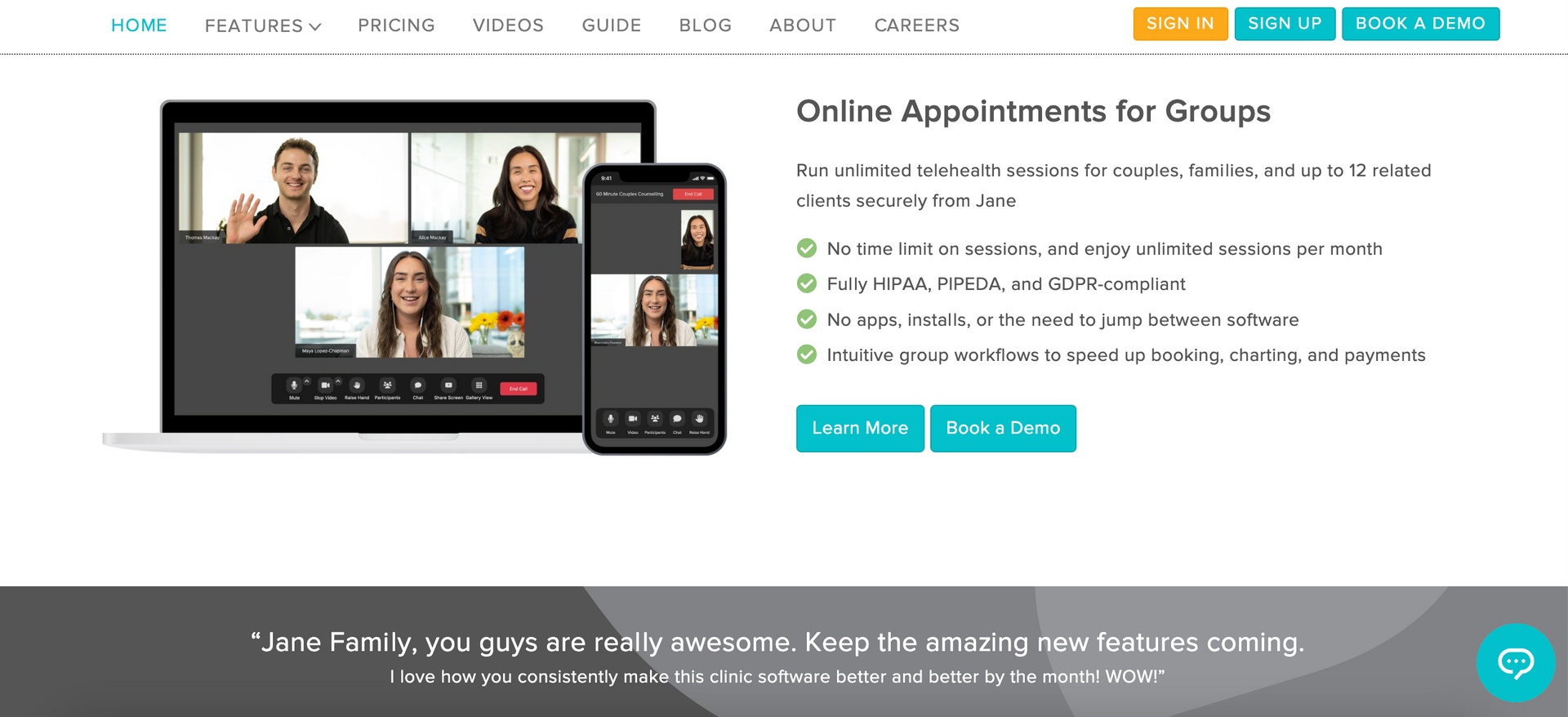
3. TherapyNotes
Overview: TherapyNotes is a powerful practice management system tailored to mental health professionals. It excels in note-taking, scheduling, billing, and client management, providing a streamlined experience for practitioners.
Main Features:
- Scheduling and To-Do List: Easily schedule appointments and manage tasks. The calendar and To-Do list are seamlessly connected to records, notes, and billing, saving time and enhancing organization.
- Notes and Electronic Records: Create detailed documentation with various note templates and maintain organized, HIPAA-compliant electronic medical records.
- Electronic Billing: Simplify billing with integrated electronic insurance claims and client payments, generating reports with just a few clicks.
- Payment Processing: Securely process credit, debit, HSA, and FSA card payments, with funds deposited directly into your bank account.
- Custom Client Portal: Enable clients to request and manage appointments online and electronically review or sign paperwork before sessions.
- Telehealth: Conduct secure video sessions, including screen sharing, directly within TherapyNotes and the custom client portal.
- ePrescribe: Manage and prescribe medications electronically from patient charts, improving efficiency and safety.
- Messaging: Utilize a secure messaging system for confidential communication between clients and practice staff through the client portal.
- Outcome Measures: Integrate measurement-based care with auto-scored outcome measures like PHQ-9 and GAD-7 to enhance client treatment.
- Customer Support: Access 24/7 phone and email support, automatic software updates, and extensive online resources.
- Security: Ensure data security with encrypted access, automatic backups, disaster recovery, and unique user roles and access controls.
Cost: Pricing starts at $59 USD per month. Pricing Details
Available in: US
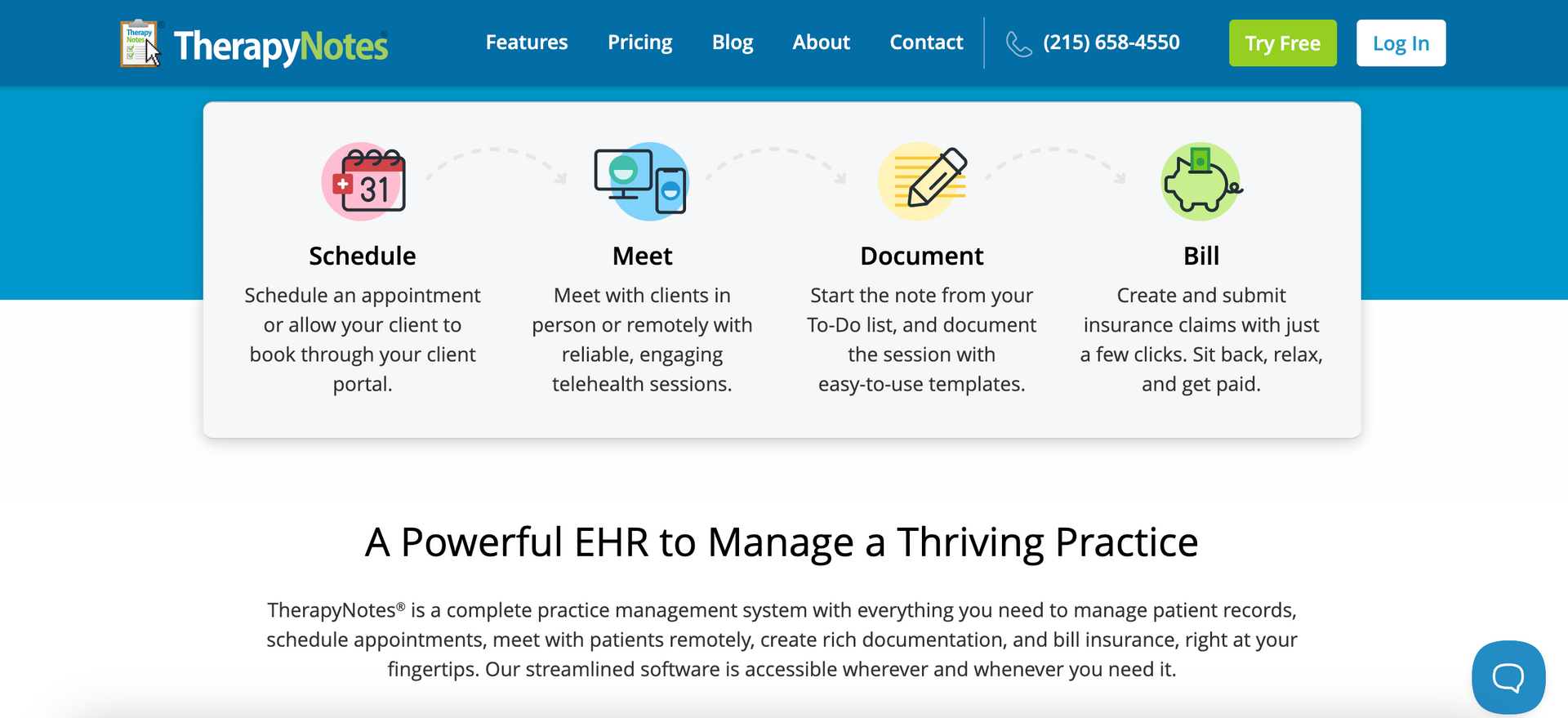
4. TheraNest
Overview: TheraNest is a comprehensive practice management software designed for mental health professionals. It provides tools for scheduling, billing, note-taking, and client management, making it a popular choice for therapists.
Main Features:
- Counseling Progress Notes: Create detailed progress notes and documentation with customizable templates, ensuring thorough and accurate record-keeping.
- Billing Tools: Manage billing processes efficiently with integrated tools for insurance claims and client invoicing.
- Managed Billing: Option for managed billing services to handle insurance and client payments, reducing administrative workload.
- e-Prescribe: Electronically prescribe medications, improving efficiency and accuracy in prescription management.
- Scheduling: Easily schedule appointments and manage your calendar with intuitive scheduling tools.
- Client Portal: Allow clients to book and manage appointments online, access their records, and complete forms electronically.
- Telehealth: Conduct secure, HIPAA-compliant telehealth sessions directly through Theranest.
- Analytics: Access business insights and performance metrics with built-in analytics tools to track practice efficiency and client progress.
- Support: Receive support through various channels, including customer service and online resources, to ensure smooth operation and problem resolution.
Cost:
Pricing starts at $42 USD per month per user.
Pricing Details
Available in:
US
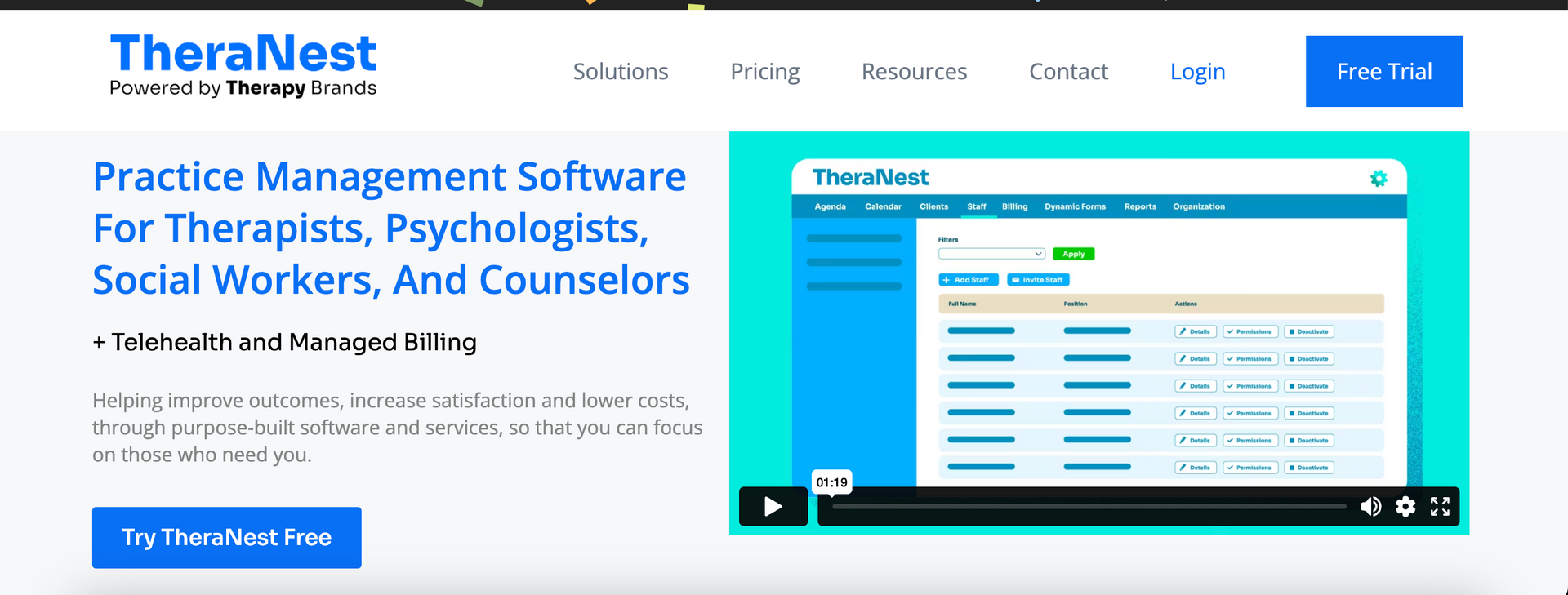
5. Headway
Overview: Headway is a unique platform that connects therapists with clients while handling all the administrative tasks, including billing, scheduling, and insurance claims. It is designed to simplify the process of running a private practice.
Main Features:
- Client Matching: Helps therapists get matched with clients based on their specialties and location.
- Insurance Billing: Handles all insurance-related tasks, from claims submission to payment processing.
- Scheduling & Payments: Simplified scheduling with integrated payment processing.
- Telehealth: HIPAA-compliant video sessions for remote therapy.
- Client Management: Tools for managing client records and communication.
Cost: Free for therapists; Headway takes a percentage of insurance payments. Get started
Available in:
US
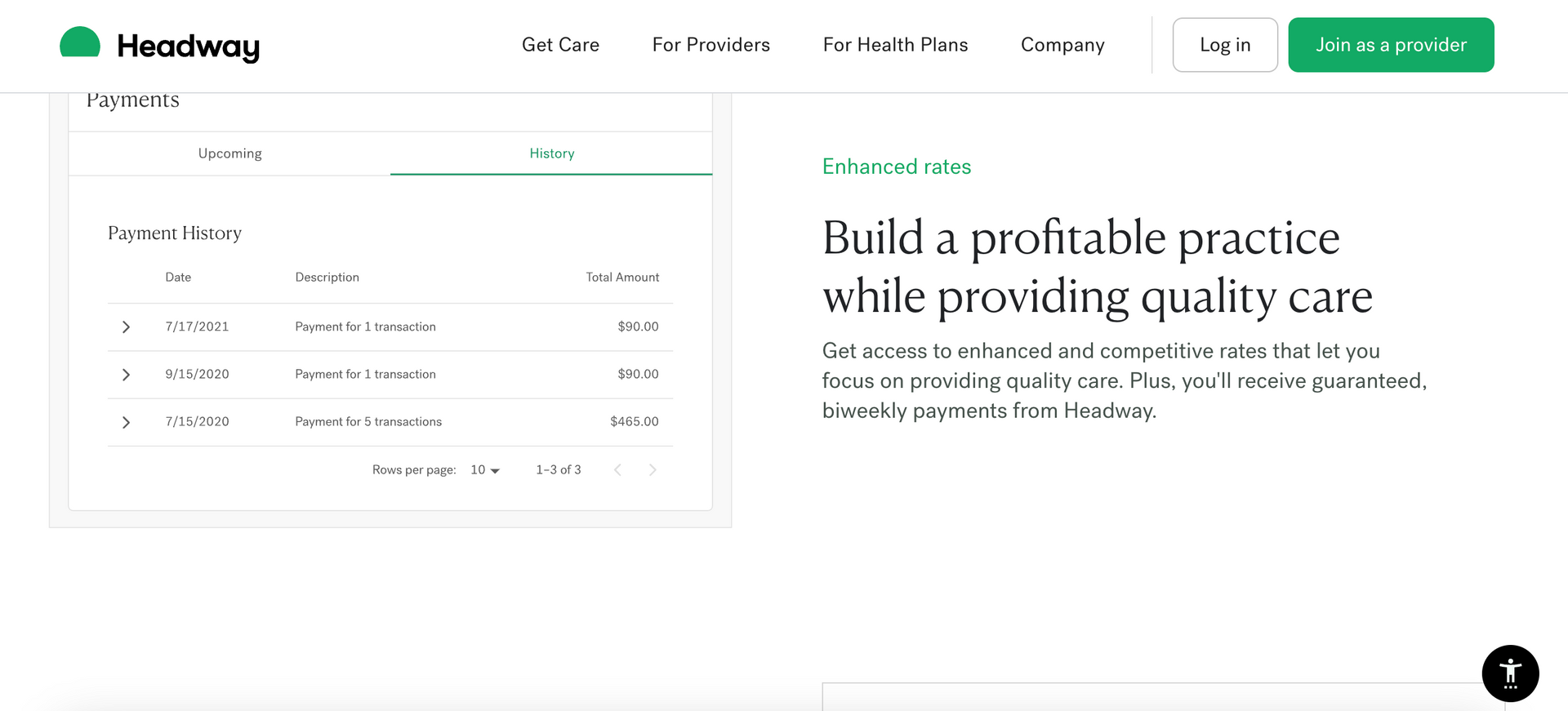
Practice management software comparison chart
What else do I need to consider for building my online private practice systems?
While practice management software is the backbone of your practice, there are additional tools and systems you should consider to fully support and grow your online private practice. These tools help you manage client relationships, build your brand, and streamline your marketing efforts.
Marketing CRM:
A Customer Relationship Management (CRM) system is essential for managing client relationships beyond just scheduling and billing. By using a marketing CRM, you can nurture leads, convert them into clients, and maintain long-term relationships with existing clients.
Website Platform:
Your website is often the first point of contact potential clients have with your practice. It needs to be professional, easy to navigate, and optimized for search engines. A good website platform allows you to showcase your services, share valuable content like blogs or videos, and provide an easy way for clients to contact you or book appointments online. Additionally, your website should be mobile-friendly and secure, protecting client information and ensuring a smooth user experience. If you’re not tech-savvy, consider working with a web designer who specializes in building websites for therapists to ensure your site meets industry standards and reflects your brand.
Email Marketing:
Email marketing is a powerful tool for staying connected with your clients and keeping your practice top-of-mind. With an email marketing platform, you can automate communication, such as sending out appointment reminders, sharing newsletters, or providing therapeutic resources. You can also segment your email list to send targeted messages based on client interests or behaviors. For example, you could send a welcome email series to new clients, follow-up emails to those who haven’t booked an appointment in a while, or offer promotions for seasonal therapy packages. An effective email marketing strategy helps you maintain ongoing communication with clients, build trust, and encourage repeat business.
By integrating these tools—marketing CRM, a robust website platform, and email marketing—you create a comprehensive online practice system that not only manages your day-to-day operations but also drives client acquisition and retention. These systems work together to help you build a thriving private practice, allowing you to focus on what you do best: providing excellent care to your clients.
Choosing the right practice management software is essential for the success and efficiency of your therapy practice.
Each software has its strengths and is tailored to different needs. By considering factors like ease of use, cost, and features, you can select the software that best fits your practice. For more guidance on setting up your practice online, explore my web design services for therapists .
Related reads:
- The best website builders for therapists
- SimplePractice vs TherapyNotes in-depth comparison
- Stress free guide to social media for therapists
- How to write an engaging Psychology Today profile
- Therapist networking tips and where to find online events
- 10 simple ways to get more therapy clients for your private practice

* AI Disclosure: This content may contain sections generated with AI with the purpose of providing you with condensed helpful and relevant content, however all personal opinions are 100% human made as well as the blog post structure, outline and key takeaways.
* Affiliate Disclosure: Some of the links on www.nataliamaganda.com may contain affiliate links meaning that I will get a commission for recommending products at no extra cost to you.

hello! i'm natalia
Latina, web design expert for mental health professionals.
I help ambitious life coaches, therapists and holistic leaders amplify their magic, gain visibility, and simplify their marketing efforts through strategic web design and content.

